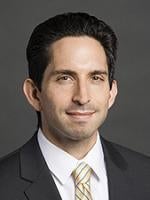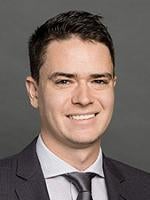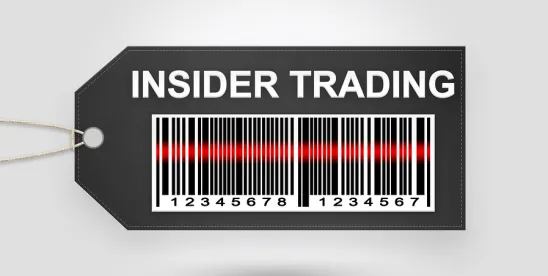On June 21, 2019, in United States v. Lee,1 Judge Paul G. Gardephe of the U.S. District Court for the Southern District of New York issued an order vacating the guilty plea of a former investment portfolio analyst, Richard Lee, to charges of insider trading based on confidential information obtained from an investment research firm that, in turn, received the information from company insiders. Judge Gardephe explained that, after Lee’s guilty plea in 2013, the Second Circuit clarified in United States v. Newman that a remote tippee such as Lee (that is, someone multiple steps removed for the source, or tipper, of the confidential information) only could be held liable for insider trading if (a) the tipper received a “personal benefit” for disclosing the confidential information and (b) the defendant knew that the information was confidential and the tipper received a personal benefit. Because no evidence that Lee knew of any personal benefit received by the tipper was before the court at the time of his plea, Judge Gardephe held that his guilty plea was insufficient under Rule 11 of the Federal Rules of Criminal Procedure.
The order confirms the lasting impact of Newman in Second Circuit insider trading prosecutions, and may serve to further deter prosecutions of remote tippees, such as Lee. While the Supreme Court eliminated an aspect of Newman, i.e., that a tipper “must also receive something of a ‘pecuniary or similarly valuable nature’ in exchange for a gift to family or friends,” it did not eviscerate the decision as some had predicted. It also demonstrates that intervening changes in law may be a valid basis for withdrawal of a guilty plea prior to entry of judgment. The order, however, leaves open questions as to the level of proof necessary to establish the elements of Newman, both in guilty pleas and other contexts.
Background
The defendant, Richard Lee, worked as a portfolio manager for SAC Capital Advisors LP, where he oversaw a portfolio focused on “special situations” such as mergers, acquisitions, private equity buy-outs, and corporate restructurings. On July 10, 2009, Lee learned that Collins Stewart, an investment research firm, was advising its clients that Yahoo and Microsoft planned a partnership transaction. Lee then ordered the purchase of Yahoo stock and engaged in a phone call with a Collins Stewart analyst, Sandeep Aggarwal, to discuss the potential transaction. During the call, Aggarwal informed Lee that an inside source confirmed that executives at Microsoft and Yahoo were engaged in “serious[]” talks regarding a partnership transaction that would likely close in two weeks. Following his call with Aggarwal, Lee continued to trade Yahoo stock in both his SAC portfolio and his personal account.
In November 2010, the government opened an investigation into Lee’s activity, including other trades in connection with a Yahoo earnings release and stock in 3Com Corporation. On July 23, 2019, Lee was charged with conspiracy to commit securities fraud and securities fraud in violation of 15 U.S.C. §§ 78j(b), 78ff, and 17 C.F.R. Parts 240.10b-5 and 240.10b5-2. The same day, in proceedings before Judge Gardephe, Lee entered a plea of guilty.
In May 2017, nearly four years after Lee’s guilty plea, the government produced an instant message that was sent at 9:13 a.m. on July 10, 2019 from Lee to Steven Cohen, the head of SAC Capital. The instant message revealed that Lee had learned information from Collins Stewart about the potential Yahoo-Microsoft partnership over two hours before Lee’s 11:30 a.m. call that day with Aggarwal.
On August 30, 2017, Lee filed a motion in the Southern District of New York seeking to withdraw his guilty plea under Rule 11 of the Federal Rules of Criminal Procedure. In support of his motion, Lee argued, first, that the newly discovered instant message demonstrated that he was innocent of trading on material, nonpublic information in connection with the Yahoo-Microsoft transaction, and, had he known about the instant message, he would not have pled guilty to other charges regarding a Yahoo earnings release and 3Com stock. In the alternative, Lee argued that his guilty plea was insufficient under the Second Circuit’s intervening decision in United States v. Newman.2 Specifically, Lee argued that there was no evidence that—as required under Newman—the tipper of the confidential information received a “personal benefit,” or that Lee was aware of that benefit.
Judge Gardephe’s Order
To begin, Judge Gardephe refused to allow Lee to withdraw his plea on the basis of the newly discovered instant message. Although Judge Gardephe recognized that a defendant’s innocence may justify withdrawal of a guilty plea, a claim of innocence “must be supported by evidence.”3 In this case, however, Judge Gardephe found that the evidence failed to show that Lee did not knowingly trade securities on the basis of material, nonpublic information. In particular, Lee’s instant message to Cohen revealed only that he learned information about a Yahoo-Microsoft partnership from Collins Stewart before ordering certain trades in Yahoo stock. It did not show the information was public, or that it had been fully impounded into Yahoo’s stock price at the time of the trades. Likewise, the instant message did not absolve Lee of liability for trades he ordered later that morning, after receiving “significantly more detailed information concerning his basis for predicting the Microsoft-Yahoo transaction” in a phone call with Aggarwal.4 Similarly unavailing was Lee’s argument that he would not have pled guilty to other charges—involving trades in connection with Yahoo earnings and 3Com—had he known about the instant message. Judge Gardephe dismissed this argument as one “not of innocence but of regret,” and, thus, not an appropriate basis for withdrawal.5
Judge Gardephe agreed, however, that Lee was entitled to withdraw his guilty plea on the basis of developments in insider trading law. Judge Gardephe observed that, under Rule 11(b)(3) of the Federal Rules of Criminal Procedure, a district court is obligated to vacate a guilty plea “if it becomes clear that there no longer is a sufficient factual basis for the plea.”6 In making this assessment, the court is required to “match[] the facts to the legal elements of the charged crime.”7 In 2014, a year after Lee’s guilty plea, the Second Circuit issued United States v. Newman,8 in which the court clarified the legal elements for a remote tippee, such as Lee, to be found criminally liable for insider trading. Specifically, under Newman, the source of the information (i.e., the tipper) must have breached a fiduciary duty “by (a) disclosing confidential information to a tippee (b) in exchange for a personal benefit,” and the tippee must “[know] . . . that the information was confidential and divulged for a personal benefit.”9 In this case, Judge Gardephe found nothing in the record, at the time of his guilty plea, to suggest that that Lee knew that any corporate insider received a “personal benefit” for providing the confidential information on which he traded. Rather, at Lee’s plea allocution, he admitted only to “trad[ing] while in possession of material nonpublic information that I had received from others under circumstances where [he] knew, or had reason to believe, other persons had breached a fiduciary duty or a duty of confidentiality.”10 Thus, the facts before the court did not match the legal elements of the charged crime.
Judge Gardephe also rejected the government’s efforts to downplay the significance of Newman. The government argued that Newman did not change the law, since it merely articulated the same “personal benefit” requirement set forth by the Supreme Court in Dirksin 1983. Judge Gardephe dismissed this argument, noting that whether or not Newman changed the law did not alter the court’s obligation to ensure the factual sufficiency of a guilty plea. Moreover, Judge Gardephe recognized that Newman did, in fact, change the law of insider trading, noting that, before Newman, the “personal benefit” requirement was not clear.11 Judge Gardephe also disagreed that Lee’s admission that he knew the tippers breached fiduciary duties rendered the guilty plea sufficient, explaining that there was no indication that Lee understood “breach of fiduciary duty” to encompass all the elements of liability under Newman.12 Accordingly, Judge Gardephe ordered the guilty plea vacated.
Implications
Judge Gardephe’s order demonstrates the lasting significance of United States v. Newman in insider trading prosecutions in the Second Circuit. The order makes clear that a tippee’s guilty plea will not be sustained unless there is sufficient evidence to establish all elements of tippee liability, including that (a) the tipper received a “personal benefit” and (b) the defendant—no matter how many steps removed from the tipper—knew of that benefit. Although this is not the first time a Southern District judge has vacated a guilty plea on this basis,13 it confirms that the requirements remain valid and Newman continues to have force today. While some viewed the Supreme Court’s 2016 decision in Salman v. United States14 as eviscerating Newman, the order reconfirms that is not the case. As Judge Gardephe noted, Salman did not call into question Newman’s core holding regarding the elements of tippee liability, but merely abrogated Newman to the extent it held that “the tipper must also receive something of a ‘pecuniary or similarly valuable nature’ in exchange for a gift to family or friends” in order to meet the personal benefit element.15
The order is also a reminder that a court may consider the sufficiency of the evidence supporting a guilty plea in light of intervening changes in the law. The time in which a court may do so, however, is not unlimited. Rule 11(b)(3) of the Federal Rules of Criminal Procedure, on which Judge Gardephe relied, provides only that “[b]efore entering judgment on a guilty plea, the court must determine that there is a factual basis for the plea.”16 Judge Gardpehe recognized that a court has a continuing obligation to vacate a factually insufficient guilty plea “up through entry of judgment,” but stopped there.17 In this case, the defendant benefited from the fact that his sentencing hearing had been delayed for years as a result of his cooperation with the government, and therefore judgment had not been entered as of the filing of his withdrawal motion. As a result, Judge Gardephe was permitted under Rule 11(b)(3) to reconsider the evidence despite nearly six years passing since Lee’s guilty plea. Where a judgment of conviction has become final, however, this avenue of attack is likely not available because, at that point, “the inquiry is ordinarily confined to whether the underlying plea was both counseled and voluntary.”18
Because Judge Gardephe did not find any evidence to support the personal benefit or knowledge elements at Lee’s plea proceeding, he did not elaborate on the extent of evidence that would be deemed sufficient in that context. His order, however, suggests a fairly high evidentiary threshold. Judge Gardephe noted with disapproval the lack of any evidence that Lee knew “(1) who the corporate insiders were; (2) whether Lee knew who they were; (3) to whom the corporate insiders disclosed material non-public information; or (4) the nature of the relationship between the tippers and those to whom they disclosed material non-public information.”19 It is unclear whether other courts would require the same evidentiary specificity in the context of a guilty plea, where the court “must simply satisfy itself that the conduct to which the defendant admits is, in fact, an offense.”20 If so, it may be difficult to satisfy for many tippees, particularly those who, like Lee, stand multiple steps removed from the original source of the information.
By closely scrutinizing the evidence in connection with Lee’s guilty plea, Judge Gardephe’s order is likely to further deter insider trading prosecutions of remote tippees, like Lee, in the Second Circuit. In a civil context, however, the standards appear to be more relaxed. Judge Jed Rakoff of the Southern District of New York has observed that the facts necessary to establish the elements for liability under Newman in a SEC civil enforcement action may fall below what is required in a criminal context: “[W]hile a person is guilty of criminal insider trading only if that person committed the offense ‘willfully,’ i.e., knowingly and purposely, a person may be civilly liable if that person committed the offense recklessly, that is, in heedless disregard of the probable consequences.”21 Thus, in SEC v. Payton, Judge Rakoff declined to dismiss the SEC’s claims under Newman, even though there was no allegation that the defendants “knew specifically” about the benefit received by the tipper.22 In a subsequent decision denying the defendants’ motion for summary judgment, Judge Rakoff further explained, “it is enough in a civil case like this one ‘that the defendant[s] knew or had reason to know of the benefit to the tipper,’ in the general sense that they understood that a benefit was provided.”23 Summary judgment may be overcome, moreover, where the evidence shows that the defendants “consciously disregarded” the circumstances surrounding the tip.24 Given the continued viability of Newman, we expect questions regarding the sufficiency of the evidence under Newman to be fertile ground for future judicial determination.
1 United States v. Lee, 13 Cr. 539 (S.D.N.Y. June 21, 2019).
2 773 F.3d 438 (2d Cir. 2014).
3 Lee, 13 Cr. 539, slip op. at 8 (quoting United States v. Hirsch, 239 F.3d 221, 225 (2d Cir. 2001)).
4 Id. at 13.
5 Id. at 15.
6 Id. at 20 (quoting United States v. Conradt, 2015 WL 480419, at *1 (S.D.N.Y. Jan. 22, 2015)).
7 Id. (quoting United States v. Calderon, 243 F.3d 587, 590 (2d Cir. 2001)).
8 773 F.3d at 450.
9 Lee, 13 Cr. 539, slip op. at 21 (quoting Newman, 773 F.3d at 450).
10 Id. at 2-3.
11 Id. at 24.
12 Id. at 24-25.
13 See Conradt, 2015 WL 480419, at *1 (vacating guilty pleas as factually insufficient “in light of Newman's clarification of the personal benefit and tippee knowledge requirements of tipping liability for insider trading”).
14 137 S. Ct. 420 (2016).
15 Lee, 13 Cr. 539, slip op. at 22 (quoting Salman, 137 S. Ct. at 428).
16 Fed. R. Crim. P. 11(b)(3) (emphasis added).
17 Lee, 13 Cr. 539, slip op. at 20 (quoting Conradt, 2015 WL 480419, at *1).
18 United States v. Broce, 488 U.S. 563, 569 (1989).
19 Id. at 23.
20 United States v. Robinson, 799 F.3d 196, 199 (2d Cir. 2015).
21 SEC v. Payton, 97 F. Supp. 3d 558, 559 (S.D.N.Y. 2015).
22 Id. at 564.
23 SEC v. Payton, 155 F. Supp. 3d 428, 433 (S.D.N.Y. 2015) (citation omitted).
24 Id. at 434.







 />i
/>i
